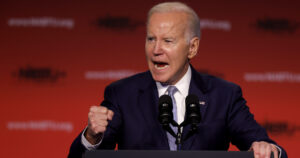The “fascist coup” narrative, a self-regarding genre of literature popular with the “Never Trump” wing of the centre-right, has enjoyed a bumper crop in 2023. Earlier this year, as the legal challenges against Trump mounted and his popularity paradoxically surged, readers were treated to McKay Coppins’s Romney: A Reckoning, a portrait of Romney’s political journey with the January 6 riots serving as a pivotal moment of introspection. In September, we had Enough, an overstuffed 400-page doorstopper of a moan from Cassidy Hutchinson, a 28-year-old former special assistant to Trump’s Chief of Staff. Then, just in time for Christmas, Liz Cheney — former Wyoming Congresswoman and daughter of Dick — released Oath and Honor, which makes an overzealous argument against Trump’s political ethos.
Each of these offerings converge on several key arguments. Foremost among them is the portrayal of Trump as not just a disruptive force but as a fundamental threat to the Republican Party’s core values and traditions. The authors long for a return to the policies and ethos of the Bush years — a combination of hawkish foreign policy, tax cuts, and socially conservative stances, such as opposition to abortion. More potent than this, however, is their united willingness to overlook a crucial aspect of Trump’s presidency: the fact that his governance was largely in line with conventional Republican policies. Trump’s administration was marked by significant achievements that resonated with the party’s base, such as the appointment of Supreme Court justices instrumental in overturning Roe v. Wade.
Having read them all, I can safely say that Cheney’s contribution stands as the archetype of the Never Trump genre. The book reflects what Cheney views as her divine right to hold a prominent role within the Republican Party. Her upbringing and lineage positioned her as a key figure in Washington, and Oath and Honor is an echo of this predetermined significance.
As befitting a modern-day Moses, Cheney’s tone is notably dramatic, characterised by an oscillation between exaggerated indignation and heavy-handed moralising. Its opening lines set a grandiose stage: “This is the story of the moment when American democracy began to unravel,” she warns. Cheney, or more likely her ghostwriter, thereafter embarks on a journey that paints a dire picture of the Trump era, framing everything in the context of America’s “unravelling”.
Beneath the surface of this dramatic narrative lies a more personal story of jealousy and resentment. In Republican Rescue, a Never-Trump memoir by Chris Christie published way back in 2021, the former Governor of New Jersey makes a point of describing his initial positive working relationship with Trump. Similarly, Hutchinson’s Enough includes detailed friendly accounts of her interactions with her future Republican opponents. These narratives, at their core, are tales of friendships that deteriorated in the turbulent waters of Trump’s presidency. What makes Cheney’s stand out, however, is the way she seemingly fell out with everyone of note in the GOP.
Yet in every volume, the emphasis on the personal comes at the expense of a more comprehensive and objective analysis of the broader political implications of Trump’s presidency. In essence, these books, particularly Oath and Honor, aren’t genuine political critiques; they are instead historically valuable reflections of personal disillusionment and the fracturing of long-standing relationships within the Republican Party, much like records of the American Whig infighting that preceded the creation of the Republican Party in 1854.
In this light, Cheney’s contribution is best understood as a culmination of a personal vendetta against both Trump and a party whose direction she has never been able to grasp. Once a prominent figure in the party and vice-chair of the House January 6 Committee, she has since found herself increasingly alienated. Her resounding defeat in the 2022 Wyoming Primary by Trump-endorsed Harriet Hageman marked not only the end of her tenure in the House but also symbolised the party’s definitive shift away from the Cheney brand of neoconservatism.
This becomes apparent in her descriptions of encounters with individuals such as Jared Kushner and Ivanka Trump, whom she criticises for not tempering Trump’s actions: “I had met both Jared Kushner and his wife, Ivanka, several times… they should have done more to stop him.” Yet Cheney’s criticisms extend beyond individual anecdotes into a broader indictment of the party’s direction. She labels the transformed GOP as the “anti-Constitution party”, a dangerous departure from the party’s traditional values in favour of a movement she deems dangerous and anti-democratic. At the heart of this is a more prosaic truth: today’s GOP is simply an anti-Cheney party.
Elsewhere, her arguments fail to address the complexities of the political landscape. She speaks of the millions of Americans who believe in election fraud narratives — warning that the GOP is on the brink of becoming a “party of QAnon” — yet fails to explore the reasons behind such beliefs. Indeed, the book is marked by its lack of consideration for context, even when it concerns her own political convictions. For instance, she conveniently omits her previous support for most of Trump’s policies, particularly during his first impeachment. She also suggests that the Democrats’ failure to subpoena John Bolton was a key factor in her opposition to that Russiagate-related impeachment, even though she didn’t give this explanation at the time; like the rest of the Republican leadership with whom she had yet to fall out of favour, she was content to call it a “sham” and a “waste of time”.
The result is that Oath and Honor is less a patriotic defence of American values than a tragedy of personal ambition. Along with every other book in the Never Trump genre, if it is to serve any function, it is as a chronicle of a tumultuous period in a Republican Party marked by ideological shifts and broken alliances. These are records of a messy and very public divorce, not just between a country and its president, but also between that president and some of his former allies. With her fondness for overblown rhetoric and love of Abraham Lincoln, Liz Cheney might even go so far as to claim they could constitute valuable last testaments in advance of a future civil war.
Disclaimer
Some of the posts we share are controversial and we do not necessarily agree with them in the whole extend. Sometimes we agree with the content or part of it but we do not agree with the narration or language. Nevertheless we find them somehow interesting, valuable and/or informative or we share them, because we strongly believe in freedom of speech, free press and journalism. We strongly encourage you to have a critical approach to all the content, do your own research and analysis to build your own opinion.
We would be glad to have your feedback.
Source: UnHerd Read the original article here: https://unherd.com/



